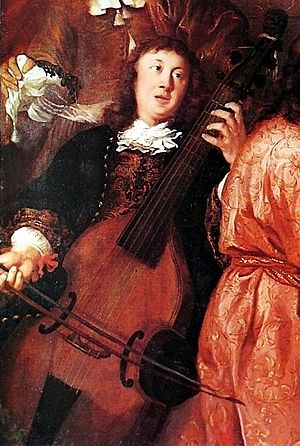Dietrich Buxtehude facts for kids
Dietrich Buxtehude (born around 1637; died May 9, 1707) was a very important German and Danish composer and organist. He lived during the mid-Baroque period. Buxtehude is famous for his amazing organ music. You can often hear his pieces at recitals and in church services. He also wrote great choral music and pieces for other instruments, like the viola da gamba. Buxtehude had a huge impact on Johann Sebastian Bach. When Bach was young, he walked over 200 miles just to hear Buxtehude play the organ!
Contents
Discovering Dietrich Buxtehude's Life
Early Years: A Danish-German Start
We don't know much about Dietrich Buxtehude's early life. We aren't even sure exactly where he was born. His family came from Buxtehude in North Germany. But they had moved to Oldesloe, which was then part of Denmark.
His father was an organist in Oldesloe. Around the time Dietrich was born, the family moved again. This time they went to Helsingborg. Today, Helsingborg is in Sweden, but back then it was also part of Denmark.
In 1641, the family moved to Helsingør, just across the water in Denmark. Dietrich Buxtehude probably went to school there. He learned music from his father. When he was 20, he got his first job. It was in Helsingborg at the Marienkirche (St Mary's Church). His father had been the organist there years before. Sweden and Denmark were fighting over Helsingborg at that time. This must have made things tricky for young Buxtehude. The people at Marienkirche spoke German.
Lübeck: A Big Job in Germany
In 1668, Buxtehude got a new job. He became the organist at the Marienkirche in Lübeck, Germany. This was a very important position. It was one of the biggest churches in Germany. The organist before him was Franz Tunder. Buxtehude married Tunder's daughter, Anna Margarethe.
His job involved more than just playing the organ. He also had to tune it. And he handled a lot of the church's daily tasks. He wrote many cantatas for the church services. He also organized five special evening concerts each year. These concerts were called "Abendmusik" ("Evening Music"). They happened at 4:00 PM after the evening service. We don't know exactly what music was played at these concerts.
Buxtehude stayed in Lübeck for the rest of his life. He didn't travel much. Nicolaus Bruhns was one of his students. Pachelbel even wrote a piece of music for him. In 1706, Johann Sebastian Bach was 21 years old. He took four weeks of holiday to go to Lübeck. He wanted to hear Buxtehude play. Bach ended up staying for four months! This got him into trouble when he returned to his job in Arnstadt.
In 1707, Buxtehude wanted to retire. There was a special condition for the next organist. They would have to marry Buxtehude's daughter, Anna. Bach and Mattheson were interested in the job. But they decided not to take it. Perhaps they didn't want to marry Anna Buxtehude. Buxtehude died that same year. His assistant then got the job and married Anna soon after.
Buxtehude's Amazing Music
The organs Buxtehude played were huge. They made very bright and grand sounds. His music is impressive and powerful. Many of his organ pieces have several parts. Each part often plays at a different speed. They often sound like someone is making up the music on the spot. Some parts are fugues, which are like musical chases.
Over 128 of his vocal works still exist. Almost all of them are church music. He also wrote music for other instruments. This included chamber music and pieces for the harpsichord.
Images for kids
-
Memorial plaque at Buxtehude House in Helsingør
-
Example 1: This is the introduction from Prelude in F major, BuxWV 145. The motivic interaction seen here, in which a short motif is passing from one voice to another, sometimes sounding in two voices simultaneously, was frequently employed by Buxtehude in his preludes, frequently expanded to four voices with heavy use of pedal.
See also
 In Spanish: Dietrich Buxtehude para niños
In Spanish: Dietrich Buxtehude para niños
 | Claudette Colvin |
 | Myrlie Evers-Williams |
 | Alberta Odell Jones |








